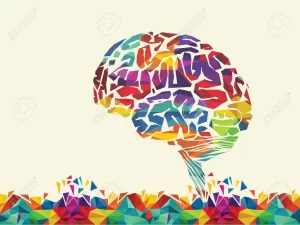As a clinician, much of my work surrounds helping clients improve their functioning and treating their obstructive ADHD symptoms. My work also includes shifting away from the negative and embracing some of the neuro-differences we experience.
As a clinician with ADHD, I have had to learn to embrace my own symptoms (the good the bad and the ugly) and adapt my mindset to say fuck it. I am the way I am, and I like the way I am. I want the same adoption of mindset for my readers.
As someone who wasn’t diagnosed with ADHD until my late 20’s, undoing the years of shame I felt throughout my life took time. And patience. Patience was something my ADHD brain really fought against. I wanted resolve now, and only now. I want immediate change, immediate fixes and future rewards aren’t nearly as enticing as right now ones.
Having ADHD for me, is like driving a Ferrari with bicycle breaks. I am moving at an exhilarating speed, but when I need to slow down, I either can’t, or I crash.
I remember being a kid and feeling I was different, but I never knew why. I didn’t want to sit still, and I couldn’t understand why I had to. I liked learning, but I didn’t like that I had to learn at such a slow pace. I wanted to understand concepts in detail, I wanted to read everything I could get my hands on to know everything about everything. My imagination was vivid, complex and full of ideas and wonder. I built an entire internal world full of dialogue, characters and escape from the mundane expectations I felt forced to fulfill in my real life.
If I fell behind in something or didn’t understand how to do it, I would feel so overwhelmed at trying to figure out how to keep up with my work I would give up entirely.
I got bored, I got frustrated and I got quiet. I did not play well with others (and arguably still don’t).
I was smart though. I learned that sitting still, being the “good girl” who was quiet, caring and got good grades is what I would be praised for. I created such a rigid routine and role for myself that I kept criticism and ridicule at bay. For the most part.
When I was a kid, I would forget to brush my teeth, have a shower, eat, remember due dates, pack my backpack, and the list goes on. After getting in trouble enough times my brain switched itself onto autopilot. I began brushing my teeth too often, showering too many times a day, checking that I locked the door three times before I left the house, never unpacking my backpack and constantly living in a state of self-doubt and fear that I would forget something I needed. My apology tour for forgotten birthdays, anniversaries and important events lived on.
I wonder what my life could have been like if someone had noticed I used to be talkative, lively, funny, and carefree. I wonder what my life would have been like if someone had told me it was okay that I forgot some things, because the other parts of me that loved so fiercely, that wanted to move and learn and create spectacular things were so much more important than the parts that didn’t fit in with what other kids my age were doing. I wonder what my life would have been like if I didn’t expect myself to be perfect.
I want to be that person for my clients. I want you to step into our sessions and feel understood and heard and noticed for the amazing traits you have that are underlying the ones you’ve been told you need to change.
I say that ADHD is a superpower because learning to mask your symptoms and play the role of being “normal” takes such dedication and ingenuity. And even after losing so much of your energy just trying to fit in and scape by, you’re still able to dive into new pursuits and continuously evolve? Damn, no wonder you’re tired. What if we take some of the pressure to mask these parts of you away? You might start noticing you function better than you have before.
After chipping away at years of messages I had received that “good” meant being smart (but not too smart), being caring, being helpful, anticipating everyone else’s needs, not interrupting, being creative (but not too creative or different), being rigid, sitting still, staying quiet and shutting down my impulses… I finally starting to find some peace and freedom from the constraints my mind had adapted.
So what if I forget to close the cupboards after I make dinner? So what if I can’t sit still for more than an hour at a time? So what if I want to change my hobbies every few months? So what if I start a project, then find something that’s so much cooler and want to start a new project? So what if I occasionally interrupt someone? So what? Fuck it. I am the way I am, and I like me.
Part of the reason I became a therapist is that I finally found a career where my day looks different every day. I get to meet new people, hear new stories, help people in different ways. My days are unique, exciting, interesting, and there is always something to learn. I can schedule my day the way I want to, not the way I’m told I have to. If I need to take a break every few hours to move my body, I can do that. If I want to dive into a new theory, or hyperfixate on cool new research, I can do that. If I want to implement training programs, teach, spend time writing, master new techniques, or even create my own… then I do that. Allowing natural dopamine into my brain feels way better than forcing it out.
I want that freedom for my clients. I want people to understand that just because you’ve been told you should go to work Monday-Friday from 9-5 and focus on data, spreadsheets, or paperwork, doesn’t mean you have to. Unless that’s your thing. If it is, awesome. If it isn’t then what is your thing? Do you need change? Different work hours? New projects to dig into? A job that stimulates your mind and challenges you? A career that is hands-on? That sounds way more awesome to me than feeling stuck, unpassionate, and unexcited.
You might not be able to change what the world thinks of you, or of your ADHD brain. But you do have control over how you want to live your life. You do have the ability to let go of some of the messages you internalized and work on your gifts. It does take patience, but that freedom is worth something. Instead of changing all these parts of you to fit into the world, maybe it’s time you try letting the world adapt to your parts?


 Have you been diagnosed with ADHD… or think maybe you should be? Wondering where to start with treatment? There can be a lot of misconceptions out there about what exactly ADHD is. So, I want to break down some of that information to make it a bit easier to understand. I also want to touch on what therapy can do to help you manage your symptoms.
Have you been diagnosed with ADHD… or think maybe you should be? Wondering where to start with treatment? There can be a lot of misconceptions out there about what exactly ADHD is. So, I want to break down some of that information to make it a bit easier to understand. I also want to touch on what therapy can do to help you manage your symptoms.
